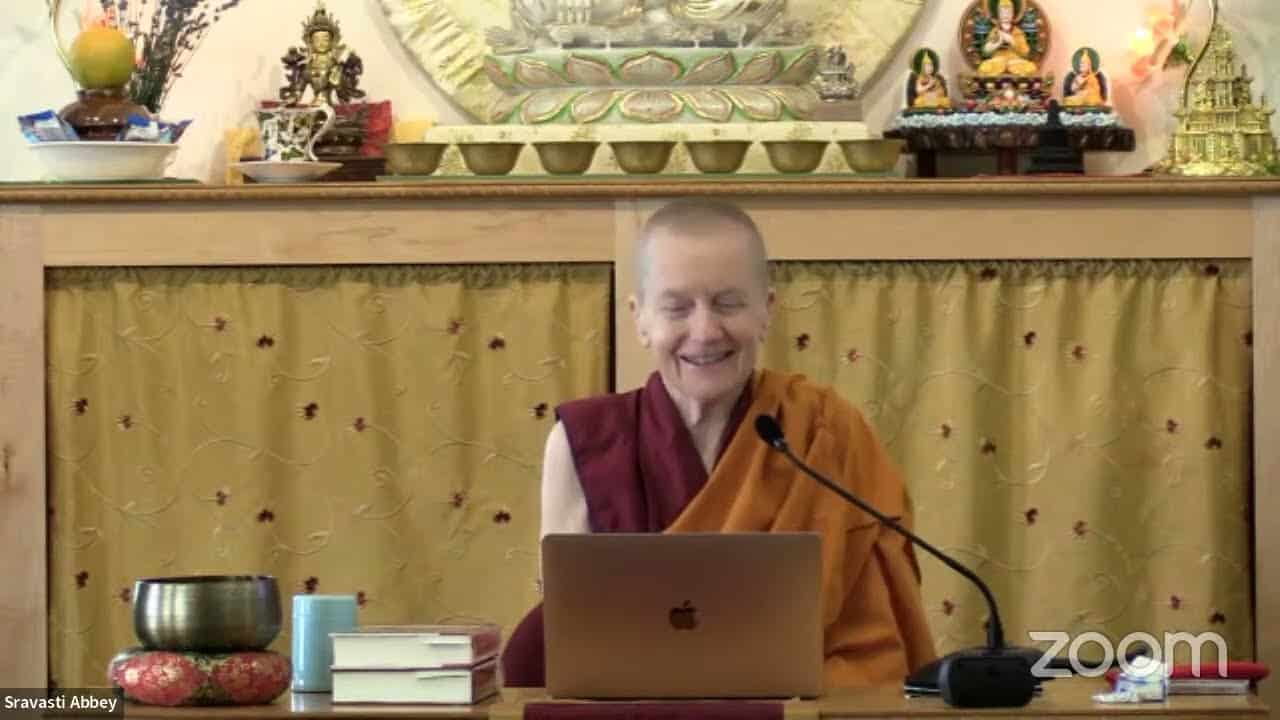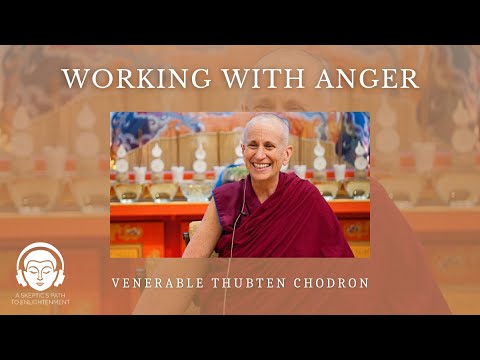Ten powers and eighteen unshared qualities
13 Following in the Buddha's Footsteps
Part of an ongoing series of teachings based on the book Following in the Buddha's Footsteps, the fourth volume in The Library of Wisdom and Compassion series by His Holiness the Dalai Lama and Venerable Thubten Chodron.
- Ninth and tenth powers
- Divine eye, seeing beings passing away and taking rebirth
- Abides in liberation of the mind mind and liberation by wisdom
- Six unshared behaviours
- No mistaken physical actions
- Speaks appropriately, truthfully and kindly
- Free from any lack of mindfulness
- Mind continuously abides in meditative equipoise on emptiness
- Does not perceive any discordant appearance of inherent existence
- Abides in perfect equanimity free from indifference
- Six unshared realizations
- Never experiences any decline of his intention and aspiration to benefit all sentient beings
- His joyous efforts to lead others to awakening never diminishes
- Mindfulness is effortless and uninterrupted
- Free from all obscurations
- Wisdom knows their state of awakening cannot degenerate
- Wisdom perfectly knows the existence of 84000 dharma teachings
13 Ten Powers and Eighteen Unshared Qualties (download)
Contemplation points
- Consider the final two of the Ten Powers. What insights does each power provide? How does that power enable the Buddha to benefit others?
- The ninth of the Ten Powers is that with the divine eye, he sees beings passing away and reappearing, inferior and superior, fair and ugly, fortunate and unfortunate. He understands how being pass on according to their actions.
- The tenth of the Ten Powers is that by realizing for himself with direct knowledge, he enters upon and abides in the liberation of mind and the liberation by wisdom that are unpolluted with the destruction of the pollutants.
- Spend some time with each of the six unshared behaviors. What would it be like to have that quality? How might you interact with others and the world around you differently?
- Due to his mindfulness and conscientiousness, the Buddha has no mistaken physical actions, whether he is walking, standing, sitting, or lying down. His feet do not touch the ground when he walks, and any insect that touches them will be reborn in a pure land. He acts in accordance with what he says, and his speech fulfills the needs of each sentient being in that moment.
- Always speaking appropriately, truthfully, and kindly, he is free from mistaken speech and chatter. The Buddha does not dispute with the world, nor does he complain or criticize what others have done.
- He is free from any lack of mindfulness regarding the dhyanas and wisdom. Without forgetting sentient beings, he teaches them appropriately.
- His mind continuously abides in meditative equipoise on emptiness and simultaneously teaches the Dharma to sentient beings.
- He does not perceive any discordant appearances of inherent existence and recognizes all phenomena as sharing the one taste of emptiness. The Buddha is not biased towards sentient beings and does not benefit those who praise him and behave well or harm those who do not.
- He abides in perfect equanimity free from indifference, knowing the individual characteristics of each phenomena as well as when sentient beings’ minds are ready to be ripened.
- Similarly, contemplate each of the six unshared realizations. What would it be like to have that quality? How might you begin to generate, cultivate, and stabilize these aspirations and qualities in your own mind even now?
- With all-encompassing love and compassion, a buddha never experiences any decline of his aspiration and intention to benefit all sentient beings or to increase their virtuous qualities.
- His joyous effort to lead others to awakening never diminishes. A buddha experiences no physical, verbal, or mental fatigue and continuously cares for the welfare of sentient beings without laziness or despondency.
- A Buddha’s mindfulness is effortless and uninterrupted. He is mindful of the situations each sentient being encounters in the past, present, and future and the methods to subdue their minds.
- Free from all obstructions, he continuously remains in samadhi with pure and stainless wisdom focused on the ultimate reality of emptiness.
- His wisdom knows that his state of awakening, which is free from both afflictive and cognitive obscurations, cannot degenerate, He lacks any dualistic appearance or grasping at duality and knows the clear light nature of the mind.
- With total freedom, his inexhaustible wisdom perfectly knows all existents, the 84,000 Dharma teachings, the doctrines of the three vehicles, as well as how and when to express them to sentient beings.
Venerable Thubten Chodron
Venerable Chodron emphasizes the practical application of Buddha’s teachings in our daily lives and is especially skilled at explaining them in ways easily understood and practiced by Westerners. She is well known for her warm, humorous, and lucid teachings. She was ordained as a Buddhist nun in 1977 by Kyabje Ling Rinpoche in Dharamsala, India, and in 1986 she received bhikshuni (full) ordination in Taiwan. Read her full bio.


